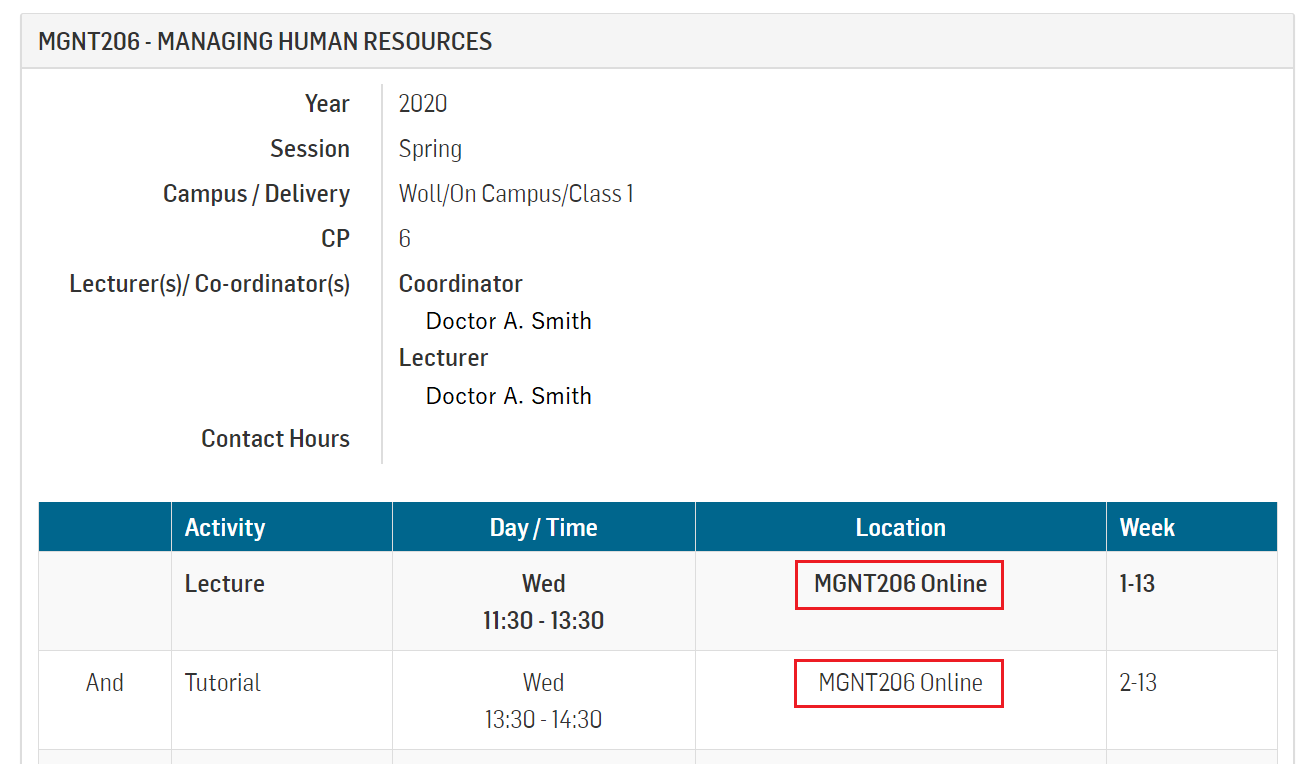Frequently asked questions
We’ve listed some of the most frequently asked questions about the subject timetable, enrolling in subjects and choosing class times. If you have a question not answered here, or need further support, please contact the AskUOW team.
- When can I enrol in subjects for my next session?
- Has my Subject Timetable been released?
- I’ve enrolled in my subjects. When can I choose my class times?
- How can I tell if any of my classes are being run on campus or online?
- Why can’t I click on my class to select a time?
- All classes for my subject are full. What do I do?
- I’m enrolled in a subject but the subject code is not appearing in my tutorial enrolment for me to choose a class?
- My class clashes with another class or lecture, what should I do?
- My tutorial has week 2, 4, 6, 8. What does this mean?
- My preferred tutorial is full
- What do the different class colours mean in my Tutorial enrolment screen?
- What does EDU STREAM mean?
- What happens if I cannot attend a class?
- What is a workshop / practical / computer lab?
- Which classes are compulsory?
- I’m unable to attend campus due to health reasons, will I be able to continue studying online?
When you can enrol in subjects depends on the session you’re enrolling in, and whether you are a new student or re-enrolling student. Enrolment dates for each session can be found on our Key Dates page.
Find more information about enrolment deadlines via AskUOW.
Publication dates for Subject Timetables are available on the Timetabling website.
Once the subject timetables for your upcoming session are published, you will receive a SOLSMail message and will be able to view timetables on the Timetabling website. To help you plan ahead, these timetables outline which subjects are running in each session, the class structure of each subject, and how subjects will be delivered (e.g. on-campus or online).
You can still enrol in your subjects before the timetable is released by using the Course Handbook.
If you have any questions regarding your timetable, please contact the AskUOW team.
Tutorial enrolment opens 2 - 5 weeks before the session starts. The exact date and time is specific to each Faculty and subject.
You can check the exact opening time for your enrolled subjects under 'Enrolment > Tutorial Enrolment' in SOLS.
Note: If your subject doesn't appear it may be too early to enrol, or details are still being finalised. Some Faculties also allocate students to certain classes, so tutorial enrolment may not be required for those subjects. We recommend you check back regularly in the lead up to session.
Visit AskUOW to find out how to enrol in tutorials once enrolment has opened.
The Subject Timetable will outline how classes will be delivered for each available subject. To check this for a specific subject, refer to the location listed against that subject’s classes, as highlighted in the screenshot below.
Some subjects may offer both on-campus and online class options, while others may only offer online classes or only on-campus classes.
Please note: Pre-recorded classes will be reflected in the location by 'Refer to Moodle' or 'Recorded' without a day or time, you do not need to enrol in these. It is also important to note that these classes will not appear in your personal timetable in SOLS. Please refer to the relevant subject Moodle site to access this content.
For more information on how to read your timetable, visit AskUOW. 
This could be due to a few reasons:
- Tutorial enrolment has not yet opened for that subject
- It’s past the last day to enrol and tutorial enrolment has closed; or
- It’s a lecture at a set time and you are not required to enrol in these.
Be sure to familiarise yourself with the relevant colour coding system for class enrolment - you can find more information on this here.
For further assistance, please contact your Subject Coordinator.
If all classes are full, you will need to contact your Subject Coordinator.
This may be because the classes have not been finalised and it is too early to enrol. Another reason could be that you have been allocated to a class by UOW staff. If you are unsure and would like assistance, please contact your Subject Coordinator.
If there are no available classes to choose from you will need to contact your Subject Coordinator who may be able to add you to one.
This means that the tutorial is not held every week i.e. it is only held on the specified weeks of session (week 1 is the first week of session).
If your preferred class or tutorial is full, you will need to choose a different option. However, if you have extenuating circumstances you can contact your Subject Coordinator to discuss your options.
Examples of extenuating circumstances which might warrant flexibility include:
- Clashes with another teaching activity that is part of a core/compulsory subject
- Unavoidable work commitments
- Childcare and carer responsibilities
- Religious or cultural commitments
- Participation in sporting events at state, national or international level with an official sporting body
You may need to provide evidence of your circumstances.
Green - The class isn't open for enrolment or has already closed.
Yellow - Class enrolment is open and available.
Pink - The class is full and you cannot enrol.
Purple - You are currently enrolled in this class.
Grey - This is a set class or lecture that doesn't require you to enrol.
For assistance, refer to the Tutorial Enrolment Instructions in SOLS, or find more information via AskUOW.
Please note: Pre-recorded classes will be reflected in the location by 'Refer to Moodle' or 'Recorded' without a day or time, you do not need to enrol in these. It is also important to note that these classes will not appear in your personal timetable in SOLS. Please refer to the relevant subject Moodle site to access this content.
Some Lecturers record their lectures live (or remotely) and upload the recording to Moodle for students to refer back to. Your Lecturer will discuss this in your first lecture, along with the subject’s attendance requirements.
You can check if your lecture is pre-recorded by following these steps:
- Log into SOLS
- Click ‘Timetable’ on the left-hand navigation menu
- Select ‘Subject Timetable’
- If “Refer to Moodle” is listed for your lecture in the 'Location' column, then it is pre-recorded and available on your subject Moodle site
If you are still unsure about how your lecture is delivered and if it is recorded, this will be noted in your Subject Outline. If you cannot find this information, you can also contact your Subject Coordinator for more information.
If you cannot attend a class you will need to notify your lecturer or tutor as soon as possible. They will advise you on what steps to take.
You are encouraged to review the information on the Moodle site and speak to other students in your subject to catch up on any material you have missed. You can also attend your Subject Coordinator's weekly consultation time to discuss any missed material. You can find your Subject Coordinator's consultation time in the Subject Outline.
For more information refer to AskUOW.
Some subjects include practical components called workshops, practicals, or laboratories. Subject timetables will outline these components for each subject in the 'Activity' column. Subject Coordinators will normally discuss the expectations, attendance requirements and other subject components during the first lecture or list these in the Subject Outline.
Visit AskUOW for more information on the different class types.
Lectures and tutorials are important for your learning and you are encouraged to attend both where possible.
Attendance requirements are different for each subject. Some subjects have minimum attendance requirements across their tutorials and labs, for example, 80% attendance. Other subjects, specifically those with accreditation requirements may have attendance of a class as part of the subject assessment.
You can find the attendance requirements in the Subject Outline for each subject. Subject Outlines are generally available 1 - 2 weeks before the start of the session on Moodle.
If you have legitimate health reasons that prevent you from attending on-campus classes, you may be able to enrol in online class options (where possible). Please contact your Subject Coordinator for further information.
If your studies are significantly impacted by circumstances out of your control, you may be eligible for Academic Consideration.
